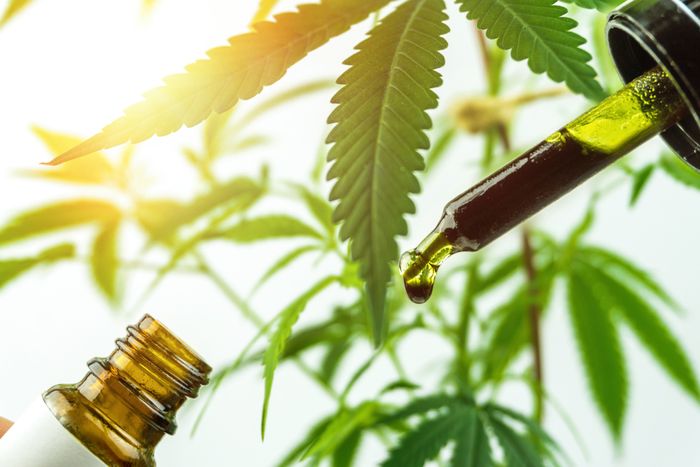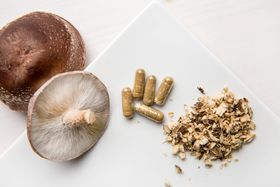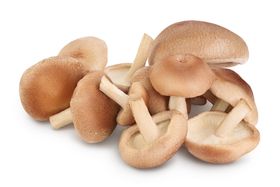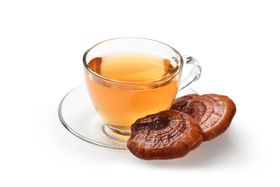Full-Spectrum CBD: What Is It, Benefits, Legality, & More
Published July 15, 2021.

Cannabidiol (CBD) is a non-psychoactive phytocannabinoid found in the cannabis plant. It has been gaining popularity in recent years as a supposedly effective way of treating many different physical and mental conditions. However, the different types of CBD products differ dramatically in their manufacturing process.
Depending on the method you'll choose to utilise your CBD (tinctures, topicals, inhaled products, etc.), all potential products will fall under one of three main categories: Full-spectrum, broad-spectrum, and isolates. They all differ in the compounds they incorporate and, therefore, in the strength of their benefits.
In this article, we'll be discussing full-spectrum CBD products and how they differ from other types in their benefits, effects, legality, and more.
What Is Full-Spectrum CBD?
Full-spectrum CBD is the most complete and unprocessed form of CBD you can purchase. Even though the main focus of CBD oils is the cannabidiol, they actually contain varying amounts of the 80-100 other cannabinoids and over 300 non-cannabinoid components.
When CBD products are made, cannabinoids are extracted from the raw plant. The degree of processing is what determines the type of product you're going to end up with. Full-spectrum products have the least processing, meaning that the final product will have the most available cannabinoids than any other product, including psychoactive tetrahydrocannabinol (THC), though not enough to give you the "high" feeling associated with marijuana.
Benefits of Full-Spectrum CBD
The inherent benefits of CBD as a substance don't vary dramatically between different CBD products. For a complete list of what CBD can do, read our post: CBD Benefits: How This Natural Compound Promotes Health and Wellness.
That being said, there are some other benefits presented by full-spectrum hemp extracts, such as:
- The entourage effect Research has shown that the beneficial effects of cannabinoids can actually be enhanced by the presence of other cannabinoids in something called the "entourage effect." This means that full-spectrum CBD, with the most present cannabinoids and terpenes, has a more potent effect than individual cannabinoids.
- More natural Less processing means less chance of unhealthy and dangerous chemicals finding their way into the final product.
Risks of Full-Spectrum CBD
Despite the supposed benefits of full-spectrum CBD oil, it is not without risk, the most prominent of which are as follows:
- Cannabinoid sensitivity Some people may be perfectly fine to take CBD as an isolated substance, but that doesn't necessarily mean that they will react well to the numerous other cannabinoids and terpenes in the cannabis plant. Poor reactions to specific cannabinoids can cause anything from hives to breathing problems.
- THC presence Though there shouldn't be enough THC in a CBD product to get you high, it could be enough to cause a failed drug test or, in extreme cases, exacerbate symptoms of anxiety or other psychiatric conditions.
Legality of Full-Spectrum CBD
Although CBD is legal in the UK, its psychoactive cousin (THC) is not. Since full-spectrum CBD does contain trace amounts of THC, what does that mean for their legality?
The short answer is that it's different per country. However, most places that still restrict THC allow for its presence in CBD products as long as it is in small doses. Most laws, including the current 2022 UK laws, usually have a solid number of 0.2% being the maximum concentration of THC allowed. This is some cause for concern as recent studies have found that many so-called "legal" full-spectrum products in the United States contain 0.3% THC or more (sometimes reaching up to 40%).
Even more dangerous is the fact that THC, even in doses as small as that, can still show up on drug tests that are searching for it. The potential for this depends on a lot of factors such as quantity, frequency of use, and your body's metabolism. If you're a frequent user of products containing THC, the substance can show up in your urine up to a month after you stop.
Furthermore, there are no requirements for CBD distributors to provide proof of what's in their products, which is why you should always buy from reputable sources that can provide 3rd-party lab results to validate their claims.
Other Types of CBD: Broad-Spectrum and Isolates
Aside from full-spectrum CBD, there are two more CBD products that you can purchase that differ from it.
Broad-Spectrum CBD
Broad-spectrum CBD is similar to full-spectrum in that it contains various cannabinoids, terpenes, and other components aside from just cannabidiol, but less so than typical full-spectrum products. Though the extraction processes are similar to full-spectrum, broad-spectrum is a more refined product. Typically (but not always), the THC is removed from broad-spectrum products along with some of the riskier components.
In general, broad-spectrum CBD is safer than full-spectrum CBD but still manages to utilise many of the benefits that come from the entourage effect.
CBD Isolate
Isolates are the most processed and refined CBD products that have every other cannabinoid, terpene, flavonoid, and other compounds aside from CBD chemically removed until you are left with the purest form of CBD, making this type of product a more expensive variation.
As explained earlier, removing the other compounds from the finished product may reduce the effectiveness of the CBD. However, this can be a suitable product for those who still want to experience some of the benefits of CBD but are worried about or sensitive to the other compounds found in the cannabis plant.
Is Full-Spectrum CBD Right for You?
There is no strict guide to determine what CBD product is best for you, but there are some basic principles you can start with.
If you aren't sensitive to THC and other cannabinoids and want to get the most benefit out of the oil, opt for full-spectrum or broad-spectrum products. However, if you work in a very conservative field of work (such as law or police work), or think you might be drug tested at some point, consider opting for 3rd-party validated broad-spectrum with zero THC or isolates instead. Finally, if you're new to the CBD world and just want to get a taste of what it can do for you with the lowest possible risk, start with an isolate and work your way up from there.







